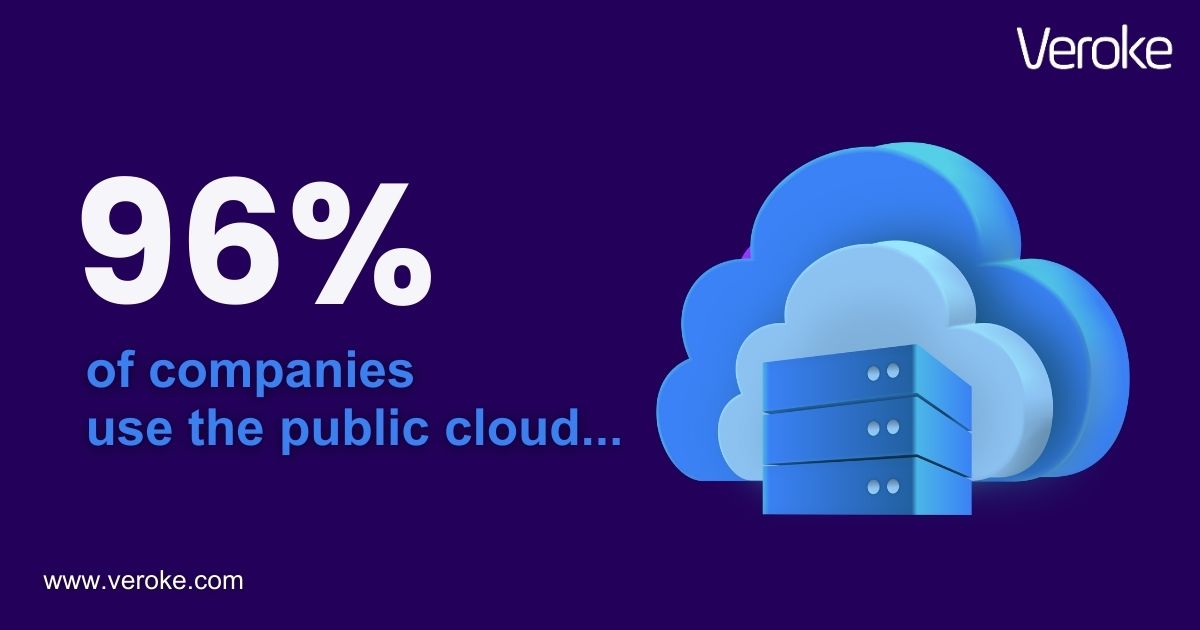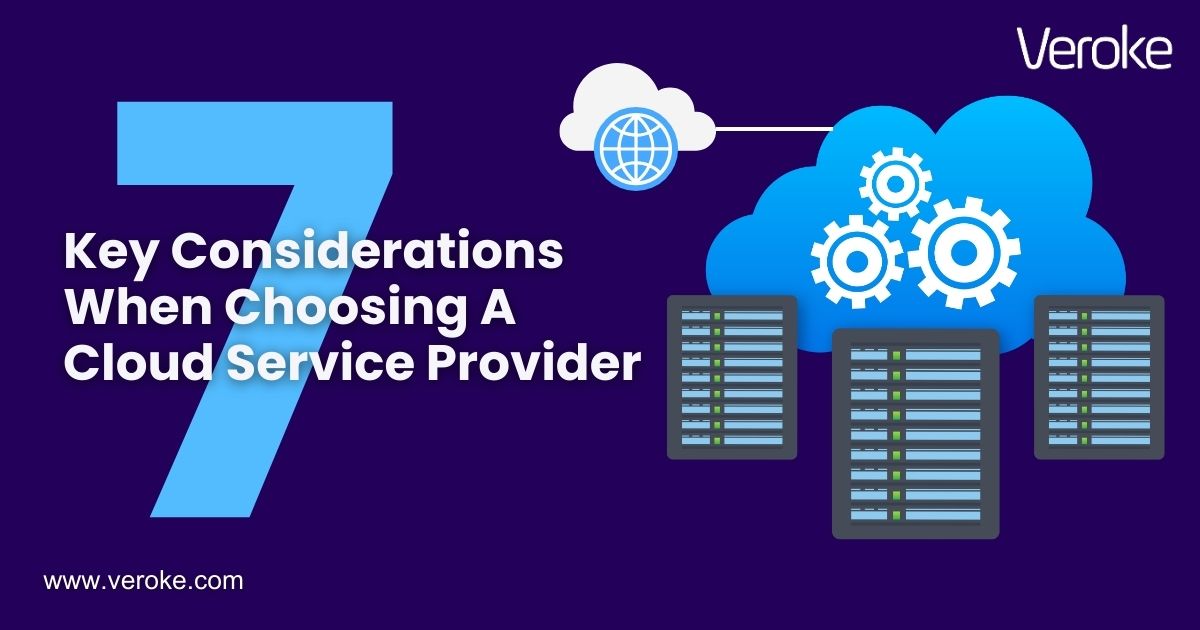Overview
Subscribe to Our Newsletter
Get expert guidance on various topics, resources, and exclusive insights
7 Key Considerations When Choosing A Cloud Service Provider
It would not be wrong to say that cloud computing has substantially disrupted the IT sector.
The crazy stats support that point: 96% of companies are using the public cloud, while 84% are using the private cloud.
Not only that, the number of people using personal clouds like Google Drive or iCloud has increased from 1.1 billion in 2014 to more than 2.3 billion people today.
It demonstrates the potential that cloud computing offers.

As we continue to see cloud adoption, picking the right cloud provider to match your company’s goals and expectations can be challenging.
There are a multitude of choices, including big players such as Amazon, Google, and Microsoft, as well as smaller providers offering bespoke services.
So how do you select the right cloud solution provider for your company?
We’ve got your back on this. In this blog post, we will cover the 7 key considerations you should not ignore when choosing a cloud service provider.
1. Scalability and Flexibility
For many businesses, sustained growth is a primary objective, and a cloud computing service should cater to this.
Even though endless expansion within finite resources might be unrealistic, but it’s essential that your cloud service can scale as your business grows. The flexibility to accommodate growth will help your business thrive.
When deciding on a cloud provider, verify their ability to offer supplementary features and increased capacity during peak periods like the holiday season or end-of-year financial reporting.
This adaptability is key for handling increased web traffic and maintaining smooth operations during high-demand periods.
Also, consider the scalability of the provider by assessing their infrastructure, which includes bandwidth, load balancers, servers, and data warehouses. Analyze their growth strategies and service levels to assess their ability to support and enhance your business’s expansion.
It is essential to carry out a preliminary assessment of the hardware and bandwidth that you are currently using, along with technical recommendations, to ensure that your cloud service plan is as comprehensive as possible.
2. Service Level Agreement (SLA)
Your service contract with a cloud provider is legally binding, so clarity on all points is essential.
Ensure it includes everything you need and excludes unnecessary terms. Review the agreement thoroughly, and don’t hesitate to request changes if you need to add or remove specific clauses.
Carefully examine the cloud computing provider’s contracts, pricing models, and SLAs. Understand the pricing structure, including any extra charges for exceeding usage limits or accessing premium features.
Evaluate the SLAs for guarantees on uptime, performance metrics, and support response times to ensure they meet your business needs.
Document clear service level expectations within the SLA, including penalty clauses for unmet expectations. Confirm the provider offers services beyond application delivery, such as business issue resolution, training, and customer support.
You should also address the ownership of data, retrieval procedures once the contract is terminated, and the amount of time it takes to process changes to the data.
3. Reliability and Performance
Another key factor to consider is the reliability and performance of the cloud solution provider. Start by reviewing their performance against SLAs from the past 6-12 months.
Some providers publish this information, while others can provide it upon request. This will help you gauge their reliability over time.
Downtime is inevitable, so it’s crucial to focus on how the provider handles it. Ensure they offer robust monitoring and reporting tools that integrate with your management systems.
It’s important to know how they plan to communicate during disruptions, including timeliness, prioritization, and assessing the severity of issues.
Verify that the provider has established, documented processes for dealing with planned and unplanned downtime. Look for guarantees of high availability and redundancy to minimize risks.
Assess their service availability, uptime, and performance. Customer reviews and references can provide valuable insights into their reliability and consistency.
4. Customer Support Services
Another key aspect to consider is the provider’s customer support. Cloud computing operates 24/7, so ensure your provider offers round-the-clock technical support, even on holidays.
Ask about their support options, including phone, email, and live chat, to ensure you can report problems easily and promptly.
Also, ask about the average time it takes for the provider to respond and resolve issues. Quick and effective support is essential to resolve issues and minimize downtime.
Well-developed training programs are also important to help users make the most of the cloud software, including training for new users and system upgrades. Be sure to evaluate the provider’s overall support services before making your choice.
Consider their availability, support channels, and responsiveness. Reliable and timely support is necessary to address any concerns that may arise during your partnership, ensuring a smooth and successful cloud migration and long-term relationship.
5. Compliance Standards and Certifications
Choosing a cloud provider that adheres to recognized standards and quality frameworks is essential. Compliance with industry best practices indicates reliability and trustworthiness.
While these standards alone shouldn’t dictate your choice, they are valuable in narrowing down potential providers. Look for certifications like ISO 27001 and GDPR compliance.
In addition, evaluate the provider’s structured processes, effective data management, and service status visibility. Understand how they plan to continuously meet these standards and support ongoing compliance.
This demonstrates their commitment to maintaining high-quality service and protecting your data.
In the end, verify that the provider holds certifications relevant to your business needs. A reputable provider will have a robust framework for data security and regulatory compliance, ensuring your information remains safe and your business stays within legal guidelines.
6. Cloud Computing Data Security
Security is important, just as in any other technology. Take a closer look at the security measures implemented by the cloud solution provider, such as data encryption protocols and disaster recovery capabilities.
Review their policies and practices regarding data privacy, access controls, and data sovereignty. A reliable provider should align with your security standards and demonstrate a commitment to protecting sensitive information.

Data leaks in cloud storage can have serious consequences for everyone involved—your company, the cloud hosting provider, customers, and stakeholders.
Cloud storage can be vulnerable to malware and ransomware, leading to data loss. Ensure the cloud service uses a multi-tenant architecture that restricts data access to authorized users only.
Top cloud service providers manage security on three levels: host, network, and physical setup.
To ensure data security, make sure your provider offers multi-factor authentication, comprehensive data encryption, high-quality firewalls, access control systems, and intrusion detection and prevention systems. These features are critical for robust data protection.
Examine the security layers within the application and the data center. Determine how the cloud vendor safeguards your data from viruses, hackers, and theft.
Consider whether the vendor operates its own data center or uses a major provider like Amazon Web Services or Microsoft Azure. While large providers offer integration benefits, in-house data centers allow for greater control over updates and data management.
7. Migration Support, Vendor Viability, and Exit Planning
Vendor lock-in occurs when a customer cannot easily switch to a competitor due to proprietary technologies or inefficient processes. This can result from contract constraints or unique components that hinder portability.
It’s important to understand how your chosen provider handles these aspects to avoid long-term limitations.
Cloud services that use unique proprietary components can make it difficult to migrate to other providers or in-house systems. This challenge is heightened if applications need to be re-architected to fit the provider’s platform.
Opt for providers that use minimal proprietary technology to maintain flexibility and avoid future complications. To mitigate the risk of vendor lock-in, choose services with competitive and comparable alternatives.
Establish policies to regularly review your options and ensure your provider does not introduce unnecessary complexities through configuration or policy changes. This proactive approach helps maintain your ability to transition smoothly when needed.
Balancing the benefits of working with key providers with the risks of becoming too dependent on them is essential. Develop a clear exit strategy from the start of your relationship with any cloud service provider.
So, understand their data access processes and retention policies to ensure a smooth transition if you decide to switch providers in the future.
Veroke Cloud Services
Choosing the right cloud service provider is a critical decision that can significantly benefit your business by enhancing data security, reducing costs, and fostering innovation.
A thorough evaluation of potential providers is important to make sure they are aligned with your organization’s requirements.
At Veroke, we understand the importance of making an informed decision. Whether you’re looking for a hybrid or on-premises cloud solution, we can help you find the perfect fit for your business. With our expertise, you can establish a long-term, successful partnership that supports your growth.
If you’re ready to elevate your operations and harness the full potential of cloud computing, contact us at info@veroke.com. Or book a free consultation and let Veroke help you unlock the power of the cloud today.
FAQs
1. What are the key requirements of a cloud service provider?
A good cloud service provider should offer flexibility to grow with your business, strong security measures to protect your data, reliable performance to minimize downtime, and excellent customer support. And they should adhere to industry standards and certifications to ensure compliance.
2. How to determine which cloud provider is good for you?
To find the right cloud provider, start by assessing your specific business needs and budget. Look at the services they offer, their performance history, scalability options, and security measures. Reading customer reviews and trying out demos can also help you make an informed decision.
3. Who are the top 3 cloud providers?
The top three cloud providers are Amazon Web Services (AWS), Google Cloud Platform (GCP), and Microsoft Azure. These giants are known for their robust infrastructure, wide range of services, and global presence, making them top choices for businesses of all sizes.
4. What are the key factors to consider when choosing a cloud service provider?
When choosing a cloud service provider, consider their reliability and performance, the quality of their customer support services, their compliance with industry standards and certifications, and their data security measures.
Transform your Ideas into a Digital Reality
Get customized bespoke
solutions for your business.




